Some commentators in the British mainstream media believe the UK has “done nothing” in the war in Syria and lament the failure to help stop it.
In fact, Britain has engaged in a covert operation with allies to overthrow President Bashar al-Assad for more than six years, and this policy has helped prolong and radicalise the terrible war. It is British action, not inaction, that is the biggest problem with government policy towards Syria. The full story of this covert operation may take years to emerge, but some elements of it can already be pieced together.
Deepening control of the Middle East
UK covert operations appear to have begun in late 2011, a few months after popular demonstrations started challenging the Syrian regime in March of that year. Already repressive, Assad’s regime resorted to violence to try to quell the protests, routinely firing into crowds, detaining thousands and subjecting many to torture.
As the number of dead at the hands of the regime mounted, so did opposition to it. The UK and its allies spotted an opportunity, which they had long been looking for, to remove an independent, nationalist regime in the region and deepen their overall control of the Middle East.
Qatar began shipping arms to opposition groups in Syria with US approval in spring 2011, and within weeks, the Obama administration was receiving reports that they were going to militant groups. By November, former CIA officer Philip Giraldi wrote that “unmarked NATO warplanes” were arriving in Turkey, delivering weapons and 600 fighters from Libya in support of the Free Syrian Army (FSA), a group of Syrian army deserters.
Britain’s MI6 and French special forces were reportedly assisting the Syrian fighters and assessing their training, weapons and communications needs while the CIA provided communications equipment and intelligence.
Thus, David Cameron’s government began covert action in Syria while having just overthrown Muammar Gaddafi in Libya, also working alongside Islamists. Some of the Libyan militants joining the Syrian insurgency were reportedly trained by British, French or US forces in Libya to fight Gaddafi. Some would later join the Islamic State (IS) or al-Qaeda’s affiliate in Syria, al-Nusra, which became the most powerful Syrian rebel group.
The ‘rat line’ of weapons
Britain became involved in the “rat line” of weapons delivered from Libya to Syria via southern Turkey, which was authorised in early 2012 following a secret agreement between the US and Turkey. Revealed by journalist Seymour Hersh, the project was funded by Turkey, Saudi Arabia and Qatar while “the CIA, with the support of MI6, was responsible for getting arms from Gaddafi’s arsenals into Syria”.
The operation was not disclosed to US congressional intelligence committees as required by US law, and “the involvement of MI6 enabled the CIA to evade the law by classifying the mission as a liaison operation”.
Hersh noted that “many of those in Syria who ultimately received the weapons were jihadists”, some affiliated with al-Qaeda. Indeed, it is believed that Qatar – which was the UK’s key ally in overthrowing Gaddafi and was now repeating its role in Syria – was pouring weapons and cash into Nusra. The Telegraph reported on a Middle Eastern diplomat saying that Qatar is responsible for Nusra “having money and weapons and everything they need”.
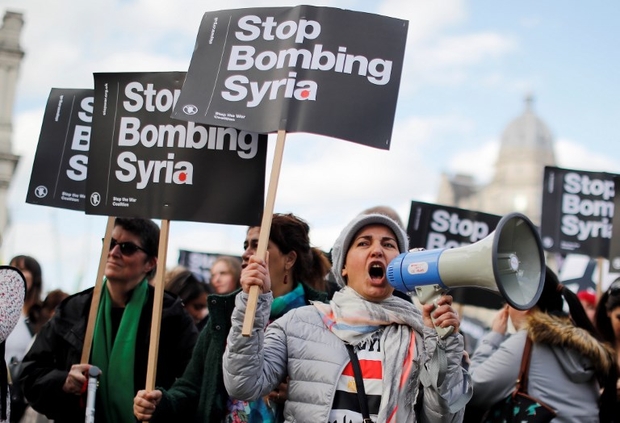
British Prime Minister Theresa May and French President Emmanuel Macron on Monday faced anger from lawmakers for conducting air strikes with the United States in Syria in their first major military action since coming to power. / AFP PHOTO / Tolga AKMEN
In 2012, the British military drew up plans to form a 100,000-strong Syrian rebel army of “moderates” to overthrow Assad, which would march on Damascus under Western and Gulf air cover. Cameron was told that this “extract, equip, train” initiative would take a year to develop, but Britain’s National Security Council rejected the idea as too risky.
However, the US plan that emerged in 2013 to train a large force of Syrian rebels was described as an “echo” of this British plan.
British training of rebels to fight Assad at bases in Jordan was authorised around this time, and special forces operating from there were reported to be “likely” slipping into Syria on missions. By August 2012, Britain’s military and intelligence base in Cyprus was also passing onintelligence to the FSA through Turkey, while Britain provided rebel groups with satellite phones to coordinate military operations.
The Foreign Office was also “teaching negotiation and ‘stabilisation’ skills to opposition leaders, and advising on how to address the Syrian people and international audiences”.
Arms funnelled to hardline groups
It was reported that the US was fully aware that most of the arms being provided by its Saudi and Qatari allies were going to “hard-line Islamic jihadists, and not the more secular opposition groups”. Yet US and British involvement in the war expanded further in November 2012 when, at a conference in Qatar of the so-called “Friends of Syria” group of countries opposed to Assad, Britain announced it was seeking to organise the armed Syrian rebels into an “efficient fighting force”.
Foreign Secretary William Hague planned to establish an interim government in northern Syria and to make Syria’s opposition forces “come together” on the ground, with the aim of toppling Assad.
Two days later, Britain’s chief of the defence staff, General David Richards, convened a meeting in London to further arm the opposition. Soon afterwards, the US coordinated an airlift of 3,000 tonnes of arms to the FSA from Croatia with the help of Britain and other European states, paid for by Saudi Arabia.
READ MORE ►
When it comes to Middle East policy, the UK is nothing but a rogue state
Lord Ashdown, the former Liberal Democrat leader, later said this massive quantity of arms ended up going “almost exclusively to the more jihadist groups”. Nusra and another hardline Islamist group, Ahrar al-Sham, secured some of the weapons being supplied to the FSA, while others inadvertently made their way to IS fighters in neighbouring Iraq.
Britain was intimately involved in Obama’s “Timber Sycamore” programme launched in April 2013, which became the major US operation to furnish arms and training to supposedly “vetted” Syrian opposition groups. The control rooms in Turkey and Jordan, manned by intelligence officers from the US, Britain, Turkey, France, Saudi Arabia and the UAE, supplied anti-tank missiles and rockets to various opposition groups.
Again, many weapons found their way to IS and al-Qaeda, sometimes being traded on the black market. The US pumped more than $1bn into Timber Sycamore, which was only shut down by President Donald Trump in 2017.
A ‘press office’ for the FSA
In Autumn 2013, Britain began a major refocus of its campaign to support the Syrian opposition, known to be dominated and driven by extremists and jihadists. The Guardian revealed it was spending £2.4m ($3.3m) for private contractors to deliver “strategic communications and media operations support to the Syrian moderate armed opposition”, in what was described as Britain running a “Free Syrian Army press office”.
Jaish al-Islam (Army of Islam), a newly formed coalition of around 50 Islamist factions funded by Saudi Arabia, was one of the groups considered by Britain to be part of the “moderate armed opposition”.
Later that year, British and US envoys secretly met leaders of some Syrian Islamist opposition groups in Ankara, reportedly in an attempt to forge a new alliance among them. The Telegraph noted that the talks included “militant groups demanding a hardline Sharia state, as the secular forces they previously backed lose ground”.
British operations in Syria with its allies have for years involved working alongside extremist and jihadist groups, in effect supporting and empowering them
It is not clear which militant groups British officials met, but a new coalition, the Islamic Front, emerged around this time, and included Jaish al-Islam and Ahrar al-Sham. The latter had regularly worked with Nusra and IS until January 2014. Ahrar al-Sham’s co-founder, Abu Khalid al-Suri, was al-Qaeda’s representative in Syria before being killed in February 2014, and he was linked to the 2004 Madrid bombing through a series of money transfers and personal contacts.
British and US covert operations were entirely focused on toppling Assad in the early years of the war. The US began air strikes against IS in Syria in September 2014. I have found no evidence of British training of Syrian rebels to fight IS before May 2015, when Britain sent 85 troops to Turkey and Jordan to train rebels to fight Assad as well.
By July 2015, Britain was training Syrians in Saudi Arabia, Turkey, Jordan and Qatar to fight IS, but the war against Assad also continued.
The myth of the moderate opposition
British operations in Syria with its allies have for years involved working alongside extremist and jihadist groups, in effect supporting and empowering them. Peter Ford, the former British ambassador to Syria, told a parliamentary enquiry in 2016 that the existence of “moderate” groups among the armed opposition was “largely a figment of the imagination”.
Although the FSA contained some secular units, it was in effect allied to IS until the end of 2013 and was collaborating with it on the battlefield until 2014, despite tensions between the groups. “We have good relations with our brothers in the FSA,” IS leader Abu Atheer said in 2013, having bought arms from the FSA.
The UK-supported rebels had an even closer relationship with Nusra. The BBC’s Paul Wood reported in 2013 that “the FSA is so close to Nusra it has almost fused with it”. The FSA has collaborated regularly with Nusra throughout the conflict.
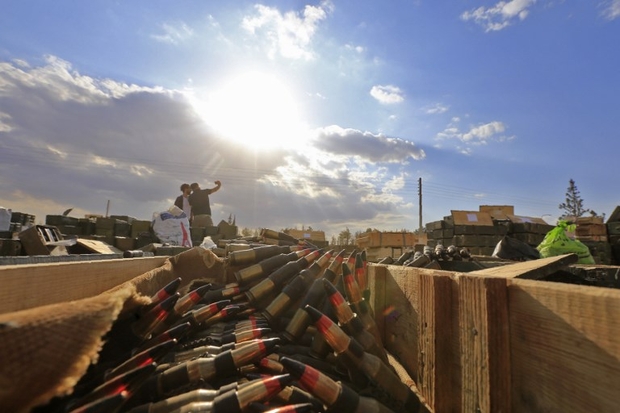
The agreement for the East Qalamun area is the latest in a string of deals that have seen rebels and civilians bussed out of former opposition strongholds near Damascus. / AFP PHOTO / Louai Beshara
In 2015, a court case collapsed at the Old Bailey against a Swedish national, Bherlin Gildo, accused of attending a terrorist training camp to fight in Syria, when it became clear that British intelligence agencies were supporting the same opposition groups as he was. British media reported that Gildo was fighting either with Nusra or a linked jihadist group, the Kataib al-Muhajireen.
Yet it was not clear whether Britain was actually supporting this particular group; it is more likely that the case collapsed since Britain was supporting the armed opposition in the form of the FSA, and these forces were largely indistinguishable from jihadist groups joined by the likes of Gildo.
Britain is unlikely to have directly armed or trained jihadist groups in Syria, but its covert war has continued in the certainty that these groups benefit from its policies. Former MI6 officer Alastair Crooke noted that: “The West does not actually hand the weapons to al-Qaeda, let alone ISIS, but the system that they have constructed leads precisely to that end.” The arms supplied to the FSA were “understood to be a sort of Walmart from which the more radical groups would be able to take their weapons and pursue the jihad”.
The attempt to “vet” groups before they receive Western aid has been a recognition of the dominant role played by extremist groups in the opposition – but the policy has been largely meaningless. Britain’s covert operation has been part of a massive programme in which Saudi Arabia has spent “several billion” dollars and Qatar $3bn funding mostly hardline, extremist groups.
Misleading parliamentarians
In 2017, the British government revealed that it spent £199m ($277m) since 2015 supporting the “moderate opposition” opposed to Assad and IS.
This support included “communications, medical and logistics equipment” and training journalists to develop “an independent Syrian media”. But details of more recent UK covert operations remain murky, and few recent media reports have uncovered the UK role.
The government is now providing misleading responses to parliamentary questions. Last week, it failed to answer a question by Labour MP Lloyd Russell-Moyle, asking which armed groups the UK had trained since 2012; it inferred it had only been training groups since 2016 fighting IS.
In response to another parliamentary question last month asking how many troops Britain currently has in Syria, the government also suspiciously failed to specify, saying only that it has 600 personnel deployed across the Middle East, again just fighting IS.
Meanwhile, the British government continues to argue that the “main opposition armed groups on the ground” in Syria “are not terrorists”, but support a negotiated political settlement of the crisis.
British policy, together with its allies, has contributed to the suffering of Syrians and has in no way been motivated by their plight. It has also contributed to the terrorist threat at home.
Hundreds of Britons, including jihadists working with the most violent groups, are believed to have been trained in Syria and encouraged to return to the UK to launch attacks. Britain’s active, warmongering policy on Syria is a disaster for the people of that country and the UK.
 Syria Support Movement solidarity with the Syrian people
Syria Support Movement solidarity with the Syrian people

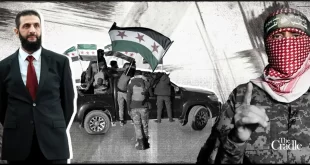
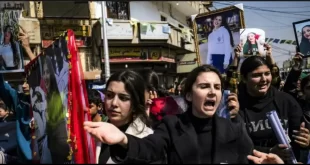
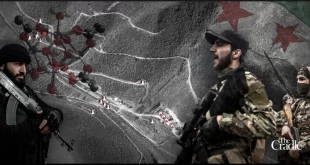
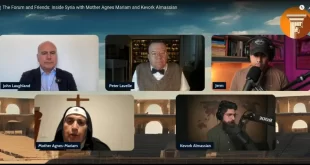
Turkish forces began shelling the YPG enclave of Afrin from frontier Hatay province, according to the state-run Anadolu news agency. Turkey has said repeatedly this week that an operation to oust the YPG from Afrin is imminent and has massed troops and armour on the border. / AFP PHOTO / Nazeer al-Khatib